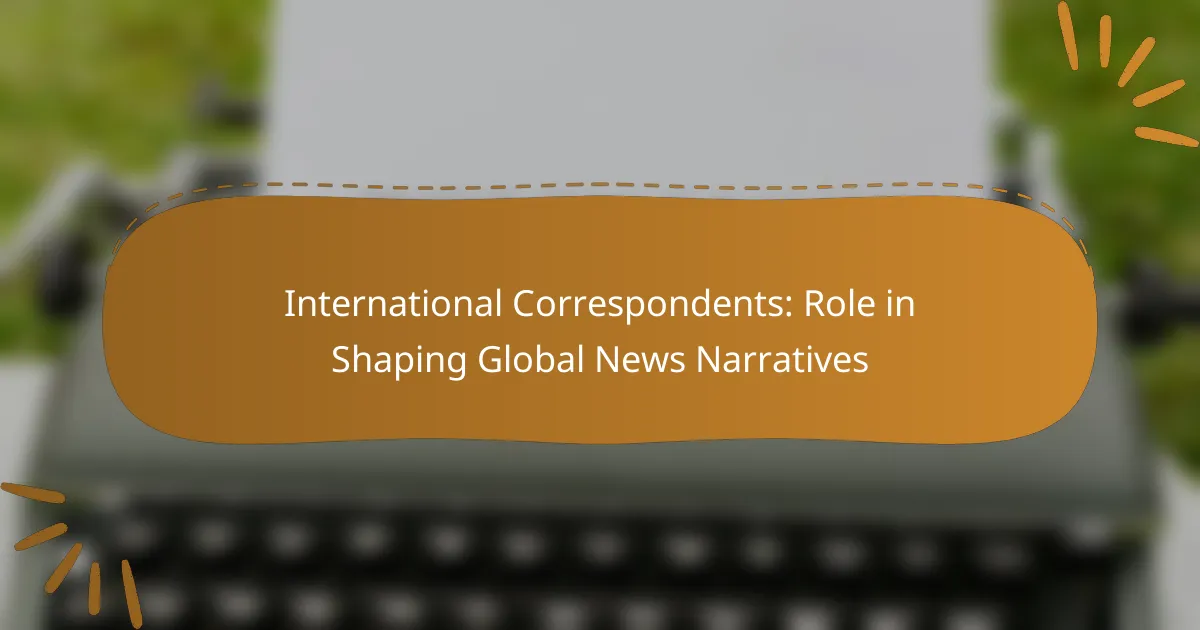International correspondents are essential in shaping global news narratives through their on-the-ground reporting and unique perspectives. By providing insights into local events and their broader implications, they significantly influence public understanding and political discourse worldwide.
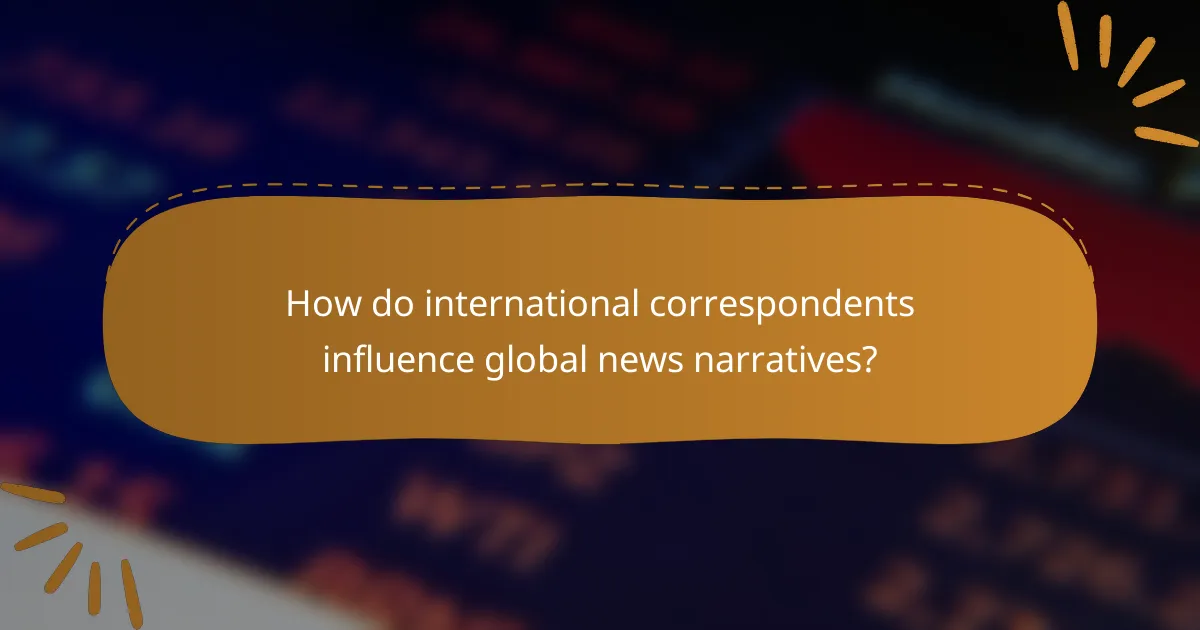
How do international correspondents influence global news narratives?
International correspondents play a crucial role in shaping global news narratives by providing on-the-ground reporting and unique perspectives that influence how events are perceived worldwide. Their insights can alter public understanding and political discussions, making their influence significant in the global media landscape.
Impact on public perception
International correspondents directly affect public perception by framing stories in a way that highlights certain aspects over others. For instance, a correspondent covering a conflict may focus on humanitarian issues, which can evoke empathy and drive public support for aid initiatives.
Additionally, the choice of language and imagery used in reports can shape how audiences view different cultures and societies. This can lead to either increased understanding or, conversely, reinforce stereotypes depending on the narrative presented.
Shaping political discourse
By reporting on international events, correspondents influence political discourse both domestically and globally. Their coverage can bring attention to specific issues, prompting political leaders to respond or take action. For example, extensive reporting on climate change can lead to increased political pressure for environmental policies.
Moreover, correspondents often serve as intermediaries between governments and the public, interpreting political actions and decisions. This role can sway public opinion and affect electoral outcomes, particularly in democratic societies where media plays a key role in shaping voter perceptions.
Framing international events
International correspondents frame events by selecting which stories to tell and how to tell them, impacting the narrative surrounding those events. For example, the framing of a protest as a fight for democracy versus a riot can lead to vastly different public reactions and policy responses.
Furthermore, the context provided by correspondents, such as historical background or cultural significance, can help audiences understand the complexities of international issues. This nuanced reporting is essential for fostering informed discussions about global affairs.
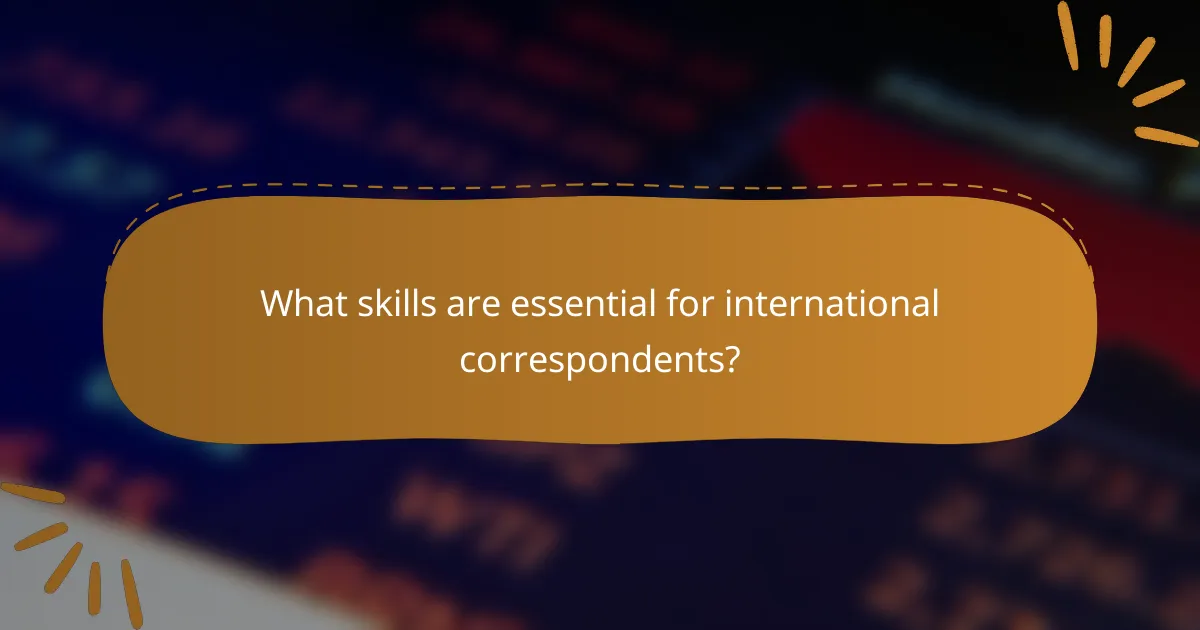
What skills are essential for international correspondents?
International correspondents require a diverse skill set to effectively report on global events. Key skills include multilingual communication, cultural sensitivity, and investigative reporting, which enable them to navigate complex international landscapes and deliver accurate narratives.
Multilingual communication
Multilingual communication is crucial for international correspondents as it allows them to engage with local sources and audiences effectively. Being fluent in multiple languages can enhance the depth of reporting and provide access to a wider range of information.
Correspondents often work in regions where English is not the primary language. For example, a correspondent in Eastern Europe may need proficiency in languages like Bulgarian or Polish to conduct interviews and gather insights that are not available in English.
Cultural sensitivity
Cultural sensitivity is essential for international correspondents to accurately represent the communities they cover. Understanding local customs, traditions, and social norms helps correspondents build trust with sources and avoid misrepresentations.
For instance, a correspondent reporting in the Middle East should be aware of cultural practices related to gender and religion, which can significantly influence how stories are received by local audiences. This awareness can prevent potential backlash and foster more meaningful connections.
Investigative reporting
Investigative reporting skills enable international correspondents to uncover hidden truths and provide in-depth analysis of complex issues. This involves thorough research, fact-checking, and the ability to connect disparate pieces of information to form a coherent narrative.
Correspondents often face challenges such as limited access to information or government restrictions. For example, a correspondent covering political unrest may need to employ creative methods to gather data, such as using social media or engaging with local activists to obtain firsthand accounts.
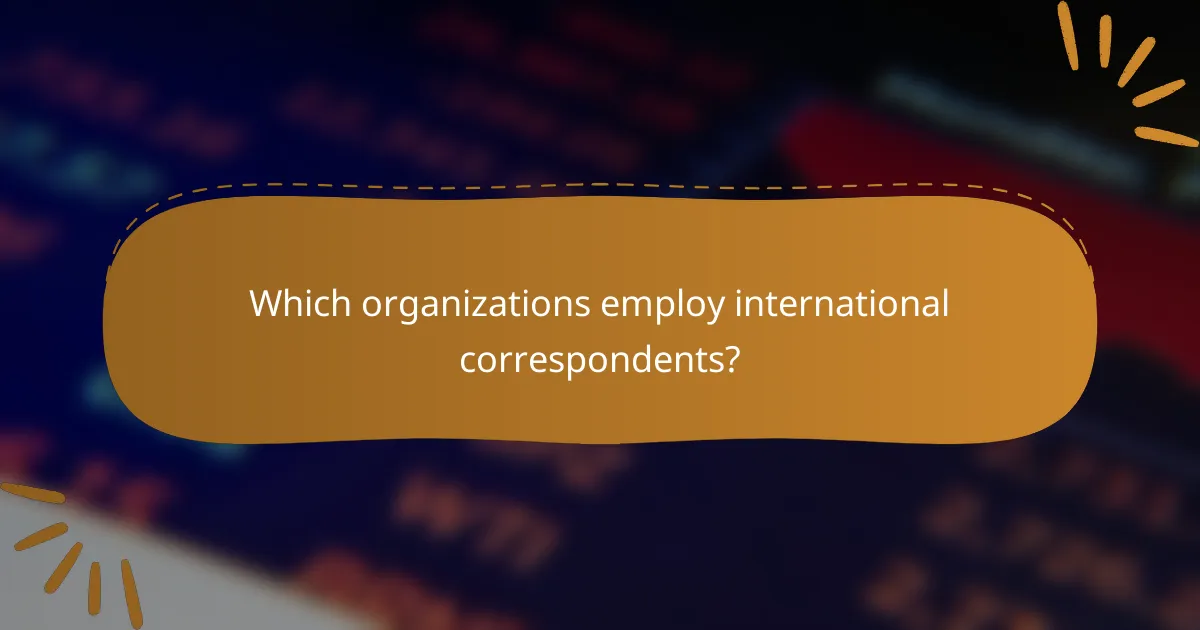
Which organizations employ international correspondents?
International correspondents are employed by various media organizations that aim to provide global news coverage. These correspondents play a crucial role in reporting from different countries, offering insights into local events and their implications on a global scale.
BBC News
BBC News employs international correspondents to cover significant global events, ensuring a comprehensive understanding of international affairs. Their correspondents are strategically placed in key regions, allowing for timely reporting on political, social, and economic developments.
The BBC’s international coverage is known for its impartiality and depth, often providing context that helps audiences grasp complex issues. For example, their reporting on conflicts typically includes historical background and expert analysis, enhancing viewer comprehension.
Al Jazeera
Al Jazeera has a robust network of international correspondents who focus on underreported regions and issues, particularly in the Middle East and North Africa. Their correspondents often provide firsthand accounts from conflict zones, which can offer unique perspectives compared to other networks.
This organization emphasizes diverse viewpoints, often showcasing local voices in their reporting. Al Jazeera’s coverage is particularly noted for its in-depth investigations and features that highlight social justice issues, making it a valuable source for understanding global narratives.
CNN
CNN employs a large team of international correspondents who report on breaking news and significant global stories. Their correspondents are often among the first on the scene during major events, providing live updates and analysis that cater to a global audience.
CNN’s international coverage is characterized by its fast-paced reporting style and extensive use of multimedia. They frequently utilize technology to enhance storytelling, such as live feeds and interactive graphics, making complex information more accessible to viewers worldwide.
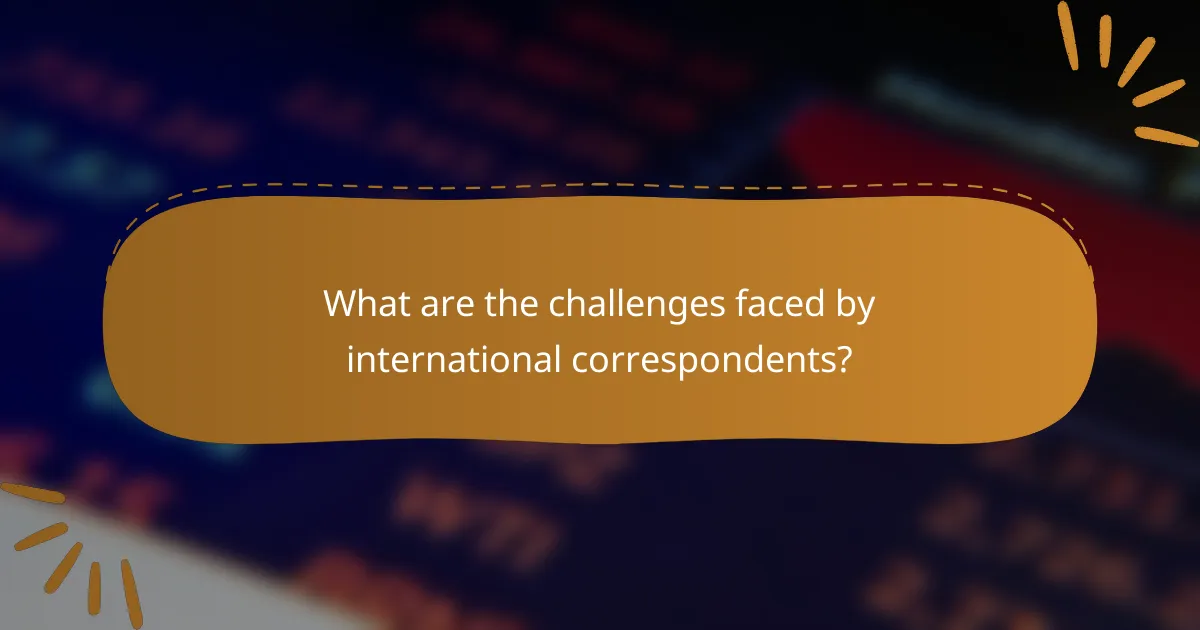
What are the challenges faced by international correspondents?
International correspondents encounter various challenges that can hinder their ability to report accurately and effectively. These challenges include safety and security risks, access to information, and political censorship, each of which can significantly impact the quality of global news narratives.
Safety and security risks
Safety and security risks are paramount for international correspondents, especially in conflict zones or politically unstable regions. Journalists often face threats from armed groups, government forces, or hostile local populations, which can lead to physical harm or even death.
To mitigate these risks, correspondents should prioritize their safety by conducting thorough risk assessments before deployment, utilizing protective gear, and establishing secure communication channels. Training in crisis management and first aid can also be beneficial.
Access to information
Access to information is a significant challenge for international correspondents, as they often operate in environments where data is scarce or controlled. This can result from government restrictions, lack of infrastructure, or language barriers that complicate communication with local sources.
To overcome these barriers, correspondents should build a network of reliable local contacts and utilize technology to gather information. Engaging with NGOs and community organizations can provide valuable insights and enhance the accuracy of reporting.
Political censorship
Political censorship poses a serious obstacle for international correspondents, as governments may impose restrictions on media coverage to control narratives. This can manifest in the form of laws limiting press freedom, intimidation, or outright bans on reporting in certain areas.
To navigate political censorship, correspondents should stay informed about local laws and regulations regarding media operations. Collaborating with international media organizations can offer support and resources to challenge censorship and advocate for press freedom.
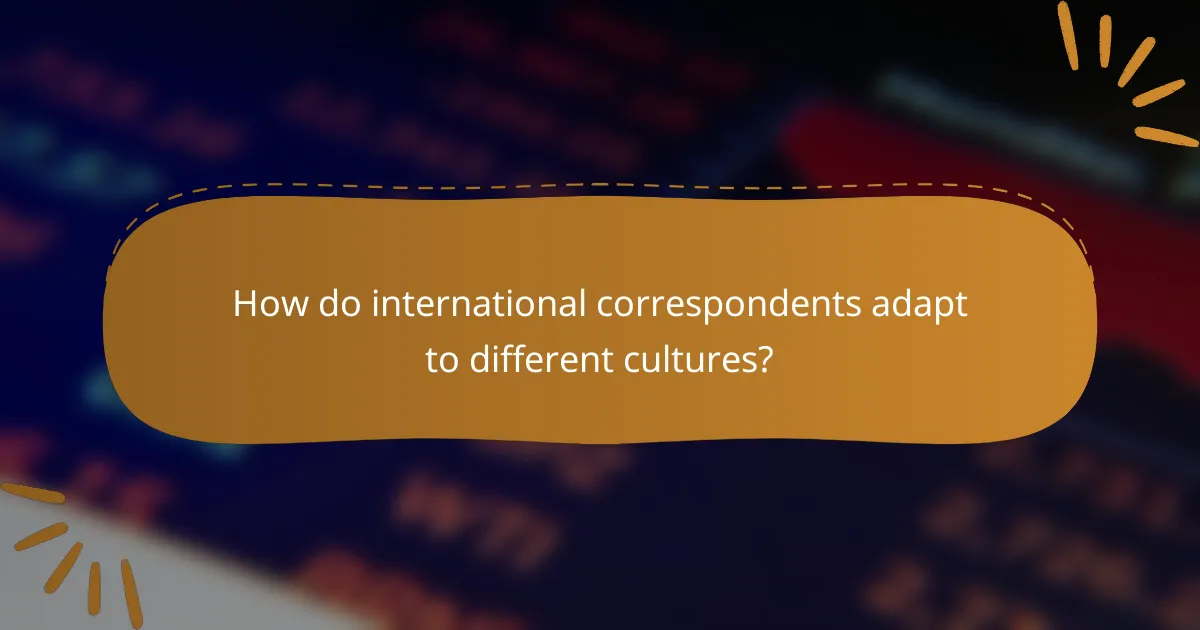
How do international correspondents adapt to different cultures?
International correspondents adapt to different cultures by immersing themselves in local customs, building networks, and utilizing local sources. This cultural sensitivity is crucial for accurately reporting news and understanding the nuances of the communities they cover.
Understanding local customs
Understanding local customs is essential for international correspondents to effectively communicate and report. This involves learning about cultural norms, traditions, and social etiquette that govern interactions within the community. For instance, greetings, gestures, and even dress codes can vary significantly across cultures.
Correspondents should take time to observe and participate in local events, which can provide valuable insights into the community’s values and priorities. Engaging with locals through informal conversations can also help reporters grasp the subtleties of cultural practices.
Building local networks
Building local networks is a key strategy for international correspondents to gain access to reliable information and sources. Establishing relationships with local journalists, community leaders, and residents can enhance a correspondent’s understanding of the region and its issues. These connections often lead to exclusive stories and deeper insights.
To effectively build these networks, correspondents should attend local events, join community groups, and actively participate in discussions. This approach fosters trust and opens doors to valuable contacts who can provide context and background on unfolding stories.
Utilizing local sources
Utilizing local sources is vital for international correspondents to ensure accurate and comprehensive reporting. Local sources can include community members, experts, and organizations that have firsthand knowledge of the issues being reported. This helps to present a more nuanced view of events and avoids the pitfalls of relying solely on external perspectives.
Correspondents should prioritize establishing a diverse range of local sources to cover various viewpoints. This can be achieved by conducting interviews, attending community meetings, and collaborating with local media outlets. By doing so, reporters can enrich their narratives and provide a more balanced representation of the stories they cover.
